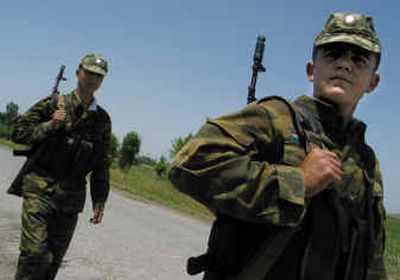Power transfer raises security concerns along Afghan border

HAMADONI REGION, Tajikistan — Lt. Col. Mahmudjon Mahmudov repelled raiders while the Soviet-Afghan war raged next door in the 1980s. He protected the rugged frontier with Afghanistan in the ‘90s during the tumultuous five years of his country’s own civil war and internal fighting between Afghans across the border.
Now Mahmudov is facing what could be the biggest challenge yet in his 17 years as a Tajik border guard: The former Soviet republic’s underpaid, underequipped and undermanned force is supposed to take control of most of the Afghan frontier from a Russian force by next summer, and complete the handover in mid-2006.
The change has raised concerns of everyone from foreign diplomats to local residents. Tajikistan is already a major trafficking route for illegal drugs from Afghanistan, the world’s largest opium producer, and militant groups have in the past operated across the border.
“We risk a very major vacuum, which could become very problematic,” Antonio Maria Costa, head of the U.N. Office on Drugs and Crime, said during a recent tour of Central Asia.
Even Tajik officers themselves point to problems. They complain they need more radios and don’t have proper lights or night-vision equipment like the Russians.
“There are only two professionals left here, me and my commander,” says Mahmudov, who bought dark-green camouflage uniforms for the pair in Moscow because the government failed to provide new ones.
Still, Mahmudov, chief of staff for a regional border guard command, insists his men can effectively control the frontier. “Soldiers never live easily,” he says.
Russian-led guards have patrolled almost the entire 749-mile Tajik-Afghan border under a 10-year agreement signed in 1993. Most of the guards are Tajiks working as contract soldiers under command of Russian officers.
Negotiations began last year on extending the deal, and most observers expected the Russians to stay. But the Tajik government this year asked them to leave — apparently more assured of itself and of international support after 13 years of independence.
“The Tajiks do have a certain degree of feelings of sovereignty about their own border,” said U.S. Ambassador Richard Hoagland. “They would like to assume full control as any normal country would assume full control of its own borders.”
Previously, the national border force controlled just over 43 miles of the frontier. This summer, it will take over patrols of mountainous Gorno-Badakhshan province, says Maj. Gen. Abdurakhmon Azimov, commander of the Tajik border forces.
The Russians will pull out of all areas except the key Pyanj region, site of a major crossing, by mid-2005, and leave there the next year, Azimov says.
The United States has pledged $8 million to the Tajik border force, of which $2.8 million has already been spent for training, uniforms, vehicles and radio equipment.
Tajik President Emomali Rakhmonov has pledged to bolster border defenses with forces from other government agencies.
Some international observers, however, expect a spike in drug trafficking — both from diminished defenses and because border economies will suffer when the Russians’ higher salaries disappear.
For example, Mahmudov earns just over US$30 a month as a lieutenant colonel. His wife, who works as a medic for the Russians and is only a master sergeant, makes more than US$270.
Azimov dismisses fears of a rise in drug trafficking, although he also criticizes U.S. troops in Afghanistan for not stopping drug production there. “They should destroy everything,” he says.
Violence also appears to be on the rise in northern Afghanistan across from the Tajik border. In June, 11 Chinese workers were shot to death in their camp and a bomb hit a car used by NATO peacekeepers, killing four civilians and injuring two children.
But the biggest worry for people living in frontier areas is simply money.
At Cafe Pogranichnik — Cafe Border Guard — just across from a Russian base, chief cook Jurabek Gaipov says every family here gets income from the Russians. “If they go, many people will be unemployed,” he says.
Kurban Karomatov, who stocks meat and cheese priced far out of reach of ordinary Tajiks at his bazaar stall, fears people will turn to crime or terrorism once the Russians leave.
“I don’t want them to go. We have relations with them like brothers and sisters,” Karomatov says.
At Tajik border guard outposts in the Hamadoni region, troops who now serve as a second line of defense behind the Russian-led force admit they have never fired their guns in conflict.
But the force has seen combat. A memorial plaque at one barracks honors six guards who died in a June 1998 clash with Afghan drug smugglers in which 10 assailants also were killed.
“We’ll get used to it,” Maj. Zokir Sharipov says of the coming changes, looking solemnly at the names of his fallen comrades. “Now we’re just learning.”